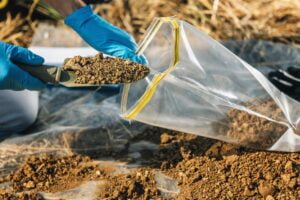At Inspection Professionals, we get a lot of questions about what we do. During Bucks County home inspections, we frequently get asked about the most common types of problems or concerns that our house inspection service uncovers. One of these issues has to do with the soil grading around homes.
What Is Soil Grading?
Grading, in a home inspection context, is the level of the ground around your home. More specifically, it has to do with how the ground level is angled with regard to your house. It’s a critical issue because it determines the flow of water around your home. There are a few types of grading that we will cover in this post.
Positive Grade
As a homeowner, this is what you want. In this scenario, the ground level gently slopes down as you move away from the side of the house. This is ideal since it means water will naturally flow away from the home.
Negative Grade
This is when the surface of the ground slopes toward your house. This causes excess water to pool near your home, which can lead to it soaking into foundation walls and flooding any basement your home may have.
Level Grade
As it sounds, this describes a level ground surface around a house. While not as bad as a negative grade, it should still be corrected to a positive grade to be ideal.
The Importance of Soil Grade
Having completed thousands of Bucks County and Philadelphia home inspections over the years, we know how common soil grade issues are. If rainwater is not properly directed away from your home, water damage will eventually result. Water can be slow-acting, which is why people can underestimate it in terms of the damage it can cause. That said, water is also relentless. If a Pennsylvania home inspector has uncovered a soil grading issue around your home, you do need to handle it promptly.
Also, make sure you don’t give yourself a soil grading problem where there wasn’t one before. Many homeowners like to make aesthetic changes to a new home after moving in. This may include landscaping and might entail putting in bushes, flower beds, walkways and other additions to improve the home’s curb appeal. Just make sure to keep soil grading issues in mind as you make these changes.
How to Handle Bad Soil Grading
When a house inspection service reports that the ground around your home has a negative or level grade, you need to take action to get it to a positive grade. Fortunately, it doesn’t have to cost an arm and a leg to regrade the ground around the house. You need to follow the four steps below.
Step 1
Your first step will be to remove any soft or porous soils, mulch, wood chips and any stones or gravel from around the area being regraded. Water flows right through these porous materials like going through a strainer in your kitchen, so they are useless in directing water flow. You need to get down to the dense dirt underneath. Save these items, though, since you’ll want to put them back down again later.
Step 2
Now, the actual regrading work can begin. You will need to use dense soil, such as clay, as much as possible. This is the type of soil that will redirect water. You should lay it down in such a way that it slopes away from the house at an angle of about half an inch per foot. It can be slightly more than this, but make sure it isn’t any less. Remember to tamp down on this new soil to eliminate any gaps or voids underneath so that water can’t readily seep through it. When completed, the surface should be 3 inches higher at the side of your home than it is at 6 feet distance from it.
Step 3
You can now put the soft soil, mulch, wood chips, stones and other removed items back on top of this new layer of dense dirt. These perform some important functions. Most notably, they prevent erosion of the dense soil underneath, and they are necessary for you to be able to grow grass and shrubs.
Step 4
This one is more of an alternative to the above rather than a fourth step. If something prevents you from regrading the soil as outlined above, you should consider getting a sump pump. This won’t stop the water from getting into your house, but it will pump it right back outside to minimize any moisture. It will usually be located in a small, recessed area of the basement floor known as the “sump pit.”
A Professional Pennsylvania Home Inspector Will Uncover Soil Grading Problems
If you are in the market for a home, having it inspected by a professional house inspection service should uncover any soil grading issues around the house. Our team at Inspection Professionals is licensed and trained to do Bucks County home inspections and Philadelphia home inspections. We also have a Montgomery County home inspector that can check out a house before you buy in that area. You might also consider having an inspection done if you are selling a home so that you can get a heads-up on any issues before putting it on the market.
It’s important to select the right Pennsylvania home inspector. The team at our house inspection service has over 25 years of experience in this field, and we’ve done over 10,000 inspections. As important as soil grade issues are, they are just one potential serious issue that you may encounter in a home you’re looking to buy. When you need a professional Pennsylvania home inspector, please give us a call, and we’ll set up an appointment at your earliest convenience.





